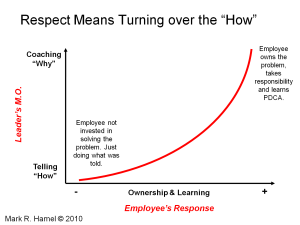Over the years I have learned to be more patient. In the not too distant past and in the interest of quick results, I frequently told people how to solve problems - which countermeasures to apply as well as where and when. I do that a lot less now, but admittedly I still sometimes lapse.
Telling is fine when time is short and the real risk to life, limb and financial viability are high. But, if we were to honestly reflect on the frequency of these types of situations, we would see that they're pretty rare. Unfortunately, it's normal to make a false choice between urgent and important.
So, what's important? Certainly, building a lean culture, part of which is an organization of effective problem solvers, is eminently important. Effective problem solvers know how to apply PDCA and take responsibility for solving their assigned or adopted problems.
How powerful is an organization of engaged and empowered problem solvers? A lot more powerful than a handful of puppet masters pulling the strings of a bunch of disenfranchised folks.
Think about it. If someone tells you "how" to solve the problem, then you do not, and cannot, really own it. You essentially end up being an un-invested robot. You also end up with very limited (felt) responsibility, because the leader took the P, C, and A away from you and left you with just the D of PDCA. When you execute what someone has told you to do (and you have little insight into the "why" ) and it doesn't work...well, it's that do-telling bozo's fault. Just following orders! I'll wait for the next set of orders. Not good.
So, what to do? Try coaching your people on the why and the underlying methodology behind PDCA. Surely, make certain that they never violate lean principles - for example, observe reality, takt, flow, pull, etc. Coach them by asking them penetrating questions that will force them to think and hopefully adjust when required. Hold them accountable, but allow them to fail...and learn. In short, respect them and gain a fellow lean thinker, lean doer and lean owner.
Related posts: Lean Leadership – Lessons from My Dog Obedience Sensei, Stretch, Don’t Break – 5 ways to grow your people

